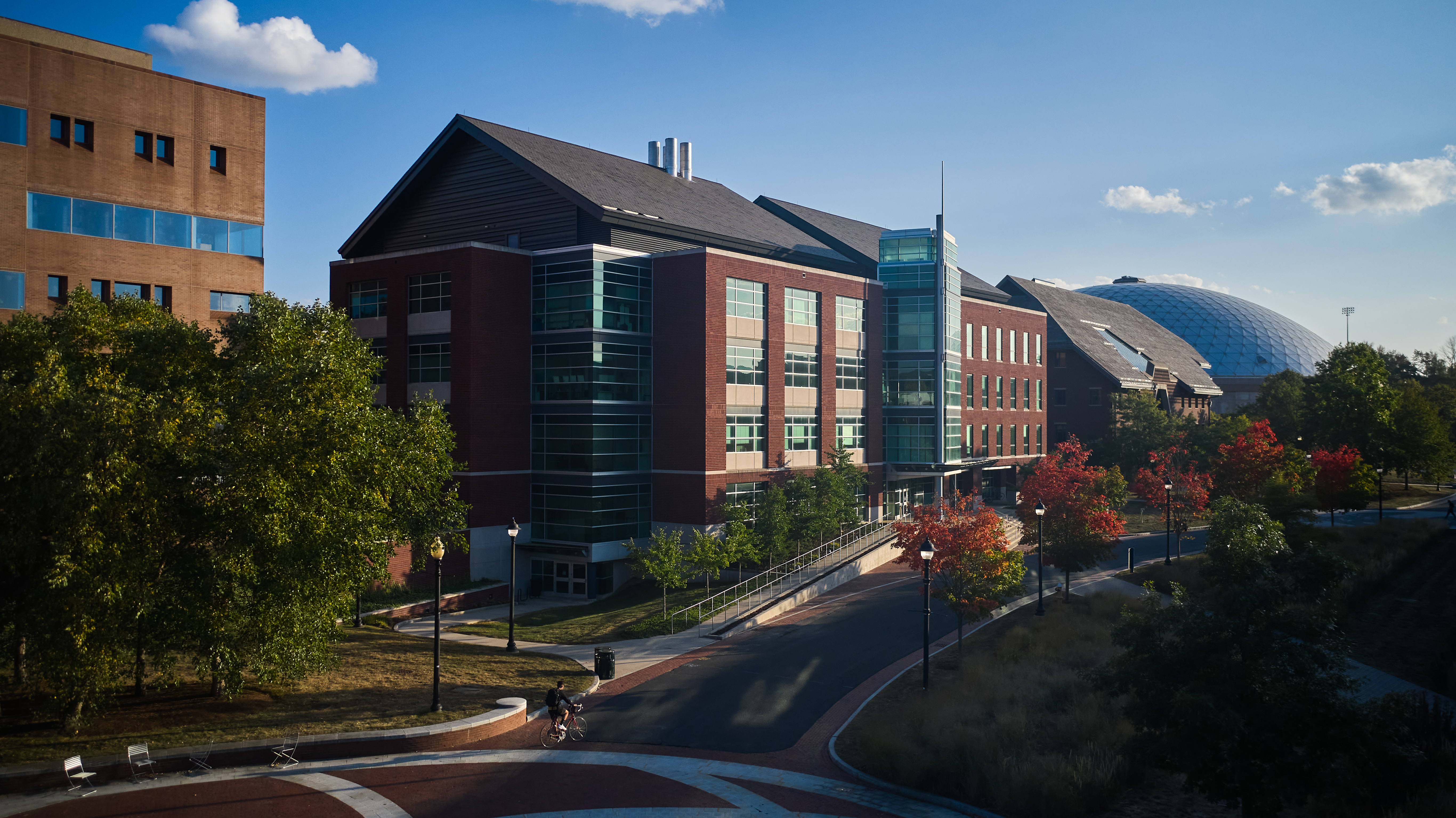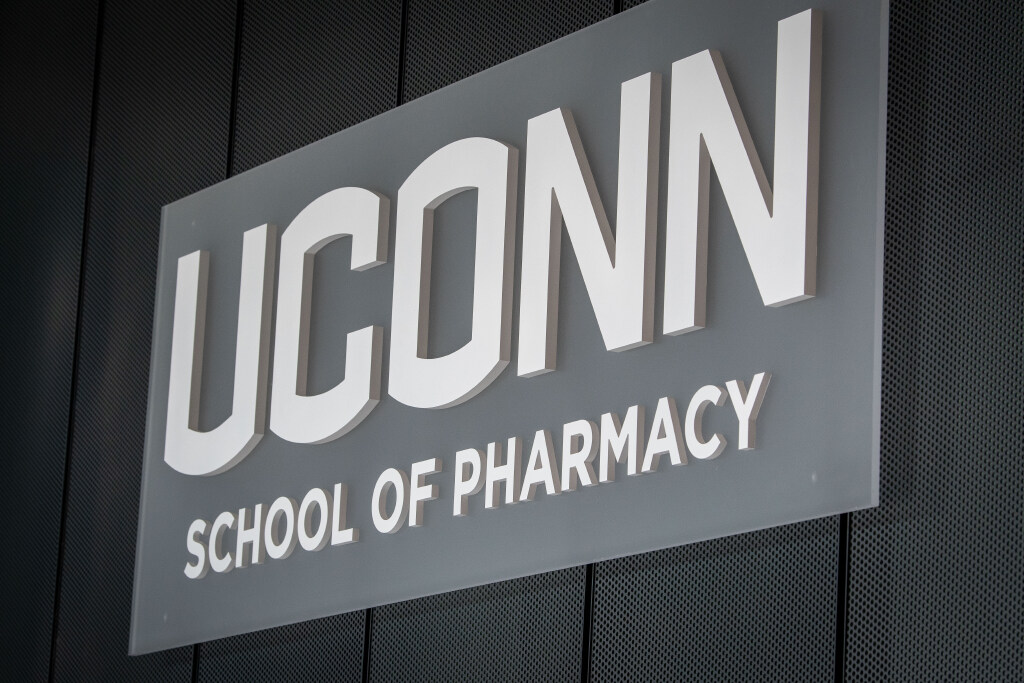UConn’s commitment to achieving carbon neutrality and promoting clean energy is continuing its steady progress, with more electric vehicle charging stations in the works and plans to install a hydrogen fuel dispenser and two more fuel cells at the Storrs campus.
The UConn Board of Trustees on Wednesday approved plans to purchase and install 18 electric vehicle (EV) chargers in seven central locations at Storrs, along with coordinating management and repairs of those stations and the 70 other publicly available charging stations already in place on the Storrs and regional campuses.
The stations will be joined to the international ChargePoint network, through which drivers can use their cellphones to locate sites throughout the U.S. and several other countries and get details about availability, pricing, charging speed, and other specifics.
The new hydrogen fuel dispenser will be installed to serve vehicles that run on hydrogen-powered fuel cells, including about 24 that will be added to UConn’s utilities fleet. Like the EV chargers, the hydrogen fuel dispenser will be available for public use.
Trustees also approved plans Wednesday to buy and install two more large fuel cells to generate electrical and thermal energy. The two units, which will be free-standing and stationary, will serve the Innovation Partnership Building (IPB) and the Putnam Refractory and Hilltop residence halls complex, respectively.
They will operate in addition to UConn’s HyAxiom fuel cell at the Depot Campus, which provides 100% of the power required for that location plus heating for the Center for Clean Energy Engineering (C2E2) research laboratories.
The various green-energy proposals that UConn trustees approved Wednesday are among many initiatives – some visible to the public, others behind the scenes – through which UConn is promoting sustainability and working toward a goal of climate neutrality by 2030.
The actions also help UConn comply with the State of Connecticut’s directives to state agencies to increase the availability and use of alternative fuel sources and infrastructure, and to promote energy sustainability in transportation and other operations.
Six of the 18 new EV charging stations to be added at UConn Storrs will be single-port stations, with three each added to the North and South parking garages. They will supplement charging stations already in place at those locations, which are popular and frequently used by motorists.
The 12 other new facilities will be dual-port stations: three each in the UConn Dairy Bar and Shippee Hall parking lots and in T Lot, near Route 195; two in Z Lot, which is behind McMahon Residence Hall; and one in the Motor Pool Lot, which has one station already.
Charging stations are already also in place throughout the Storrs campus and nearby, including the Mansfield Community Center parking lot and the Downtown Storrs parking garage. Stations also are available on most UConn regional campus properties or adjacent to them.
As part of the Board of Trustees’ vote on Wednesday, UConn will also piggyback on a state Department of Administrative Services (DAS) contract through which it can purchase the necessary EV charging stations equipment and repair services.
Much of the cost of adding the stations is subsidized by a commercial electric vehicle charging rebate program offered by Eversource, and grant funds distributed by the State of Connecticut from a federal settlement with Volkswagen Corp. over alleged violations of the U.S. Clean Air Act.
The hydrogen fuel dispenser will be installed near the UConn Reclaimed Water Facility, which went online in 2013 and has been a substantial feature in the University’s sustainability successes over the past decade.
It “reclaims” wastewater by cleaning it to a level at which it can be used to cool the fan turbines at UConn’s on-campus power plant, helping free up the campus supply of drinkable water for other uses. Eventually, the reclaimed water might also be used to produce hydrogen for the new fueling station, if research is conducted to determine the best membrane to use in the process.
The new hydrogen fuel dispenser will be used by the 24 new UConn utility vehicles that will be added to the fleet, and it will also be available to members of the public who drive cars powered by hydrogen fuel cells.
Those vehicles are more numerous in some Asian countries and parts of California than they are yet on the East Coast. However, they are growing in popularity and visibility here as well, such as the Toyota Mirai that President Radenka Maric drove in May 2022 with U.S. Energy Secretary Jennifer M. Granholm when Granholm visited UConn.
Just last week, in fact, the Philadelphia Eagles unveiled their new hydrogen refueling station at Lincoln Financial Field as part of its initiative to transition its passenger vehicle fleet to hydrogen fuel cells, which provide clean energy and recharge faster than electric vehicles.
“We are on the cutting edge of what’s being done on the East Coast, but it’s fairly familiar already on the West Coast and some other parts of the world,” says Stanley Nolan, UConn’s interim associate vice president for facilities operations.



